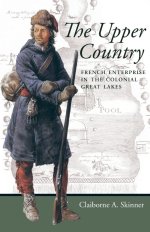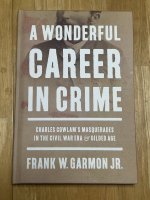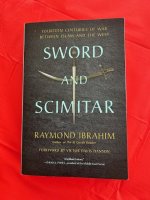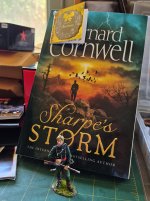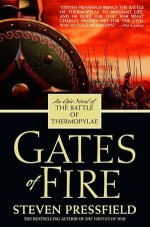You are using an out of date browser. It may not display this or other websites correctly.
You should upgrade or use an alternative browser.
You should upgrade or use an alternative browser.
What are the Forum members reading (2 Viewers)
- Thread starter Deitz
- Start date
theBaron
Major
- Joined
- Mar 27, 2008
- Messages
- 10,526
I wrapped up some "commemorative" re-reading. For the anniversary of the Battle of the Coral Sea, I read the Osprey Campaign number on the battle-the only book specifically on the battle that I have-followed up by John Lundstrom's "First Team: Pacific Naval Air Combat from Pearl Harbor to Miday". That includes the Coral Sea, naturally. Then I read Walter Lord's "Incredible Victory" and Parshall & Tully's "Shattered Sword" for the Midway anniversary. And today I read through Cornelius Ryan's "The Longest Day". So I'm good till the Fourth.
Prost!
Brad
Prost!
Brad
Mark Terbush
Private
- Joined
- Mar 17, 2025
- Messages
- 40
The civil War by Shelby Foote.
Combat
Brigadier General
- Joined
- Jun 10, 2005
- Messages
- 11,057
"Hitler's Final Fortress - Breslau 1945" by Richard Hargreaves. A very well-written account of the brutal last months of the war. It doesn't just focus on the final battle but the preamble including the disastrous civilian evacuations. Hargreaves also has a new book "Opening the Gates of Hell" about the first two months of the invasion of Russia in 1941.
Combat
Brigadier General
- Joined
- Jun 10, 2005
- Messages
- 11,057
This one looks interesting:
"Sifting through layers and layers of myth and legend—from nineteenth-century dime novels like Deadwood Dick, to HBO prestige dramas to the casino billboards outside of present-day Deadwood—Peter Cozzens unveils the true face of Deadwood, South Dakota, the storied mining town that sprang up in early 1876 and came raining down in ashes only three years later, destined to become food for the imagination and a nostalgic landmark that now brings in more than two and a half million visitors each year."
Deadwood: Gold, Guns, and Greed in the American West by Peter Cozzens.
"Sifting through layers and layers of myth and legend—from nineteenth-century dime novels like Deadwood Dick, to HBO prestige dramas to the casino billboards outside of present-day Deadwood—Peter Cozzens unveils the true face of Deadwood, South Dakota, the storied mining town that sprang up in early 1876 and came raining down in ashes only three years later, destined to become food for the imagination and a nostalgic landmark that now brings in more than two and a half million visitors each year."
Combat
Brigadier General
- Joined
- Jun 10, 2005
- Messages
- 11,057
I started this one and it's very well done. Great for any fan of the HBO series. Even the tiresome politically correct nonsense about how the Native Americans were mistreated can't ruin it.This one looks interesting:
Deadwood: Gold, Guns, and Greed in the American West by Peter Cozzens.
"Sifting through layers and layers of myth and legend—from nineteenth-century dime novels like Deadwood Dick, to HBO prestige dramas to the casino billboards outside of present-day Deadwood—Peter Cozzens unveils the true face of Deadwood, South Dakota, the storied mining town that sprang up in early 1876 and came raining down in ashes only three years later, destined to become food for the imagination and a nostalgic landmark that now brings in more than two and a half million visitors each year."
'Project Hail Mary' - Andy Weir
What a great book, it's in my Top Five list of the Best Science Fiction Books of All Time, no surprise really as it's by the same author of 'The Martian' that became a huge movie success. And it won't be long before the movie based on 'Project Hail Mary' comes out.
What a great book, it's in my Top Five list of the Best Science Fiction Books of All Time, no surprise really as it's by the same author of 'The Martian' that became a huge movie success. And it won't be long before the movie based on 'Project Hail Mary' comes out.
theBaron
Major
- Joined
- Mar 27, 2008
- Messages
- 10,526
I haven't had as much time for reading lately as in the past, but I reread "Jurassic Park" and "A Canticle for Leibowitz" again. Those are two sci-fi novels I enjoy so much that I've read them maybe 20 times each over the years.
I also re-read "The Caine Mutiny". It's a good novel, but I think I like the movie version better. Barney Greenberg's speech at the climax is such a great scene. Though I do enjoy Wouk's full story in the novel, following Willie's career and maturation.
In the queue: "The First Battle of Manassas" by John Hennessy, and "The Shadow of Vesuvius: A Life of Pliny" by Daisy Dunn.
Prost!
Brad
I also re-read "The Caine Mutiny". It's a good novel, but I think I like the movie version better. Barney Greenberg's speech at the climax is such a great scene. Though I do enjoy Wouk's full story in the novel, following Willie's career and maturation.
In the queue: "The First Battle of Manassas" by John Hennessy, and "The Shadow of Vesuvius: A Life of Pliny" by Daisy Dunn.
Prost!
Brad
Deitz
Command Sergeant Major
- Joined
- Jun 29, 2008
- Messages
- 2,475
A Wonderful Career in Crime by Frank W. Garmon JR. Mr. Garmon was a speaker at a Civil War Round Table I attend. The Lincoln Davis Civil War Round Table. It is held in a suburb south of Chicago.
The person in this book was quite interesting he was pardoned by both Lincoln and Davis, worked for the US, Canadian and British Governments among other cons he pulled.
The person in this book was quite interesting he was pardoned by both Lincoln and Davis, worked for the US, Canadian and British Governments among other cons he pulled.
Attachments
Combat
Brigadier General
- Joined
- Jun 10, 2005
- Messages
- 11,057
Mexico - A 500 Year History by Paul Gillingham:
From acclaimed and prize-winning historian Paul Gillingham, a rich and vibrant history of one of the world’s most diverse, politically ground-breaking, and influential of countries
At the beginning of his masterful work of scholarship and narration, Paul Gillingham writes, from its outset “Mexico was more profoundly, globally hybrid than anywhere else in the prior history of the world.” Over the ensuing five centuries, Mexicans have prefigured and shaped the course of human lives across the globe.
Gillingham begins in 1511 with the dramatic shipwreck of two Spanish sailors in the far south of Mexico. Ten years later Hernán Cortés led an army of European adventurers and indigenous rebels to seize the legendary island city of Tenochtitlán, the center of Montezuma’s empire, the largest in the Americas. The capture of the future Mexico City was, more than an extraordinary military event, the collision of two long-separated worlds, radically different in everything from biota to urban planning. Spaniards discovered tomatoes, chocolate, and a city larger and more sophisticated than anything they had ever seen. Mexicans discovered horses, wheels, and lethal germs, sparking a cataclysmic century of disease that wiped out a majority of the pre-existing population and led to a unique recombination of European and indigenous cultures. The industrial mining of Mexico’s silver transformed the wealth and trade of the world. Mexico’s independence from the Spanish Empire in 1821 led to a calamitous mid-century war with the United States and one of the first great social revolutions that brought peace for Mexicans throughout many of the global horrors of the 20th century, before the country itself collapsed into the violence of the cartels and a refugee crisis in the 2000s.
From acclaimed and prize-winning historian Paul Gillingham, a rich and vibrant history of one of the world’s most diverse, politically ground-breaking, and influential of countries
At the beginning of his masterful work of scholarship and narration, Paul Gillingham writes, from its outset “Mexico was more profoundly, globally hybrid than anywhere else in the prior history of the world.” Over the ensuing five centuries, Mexicans have prefigured and shaped the course of human lives across the globe.
Gillingham begins in 1511 with the dramatic shipwreck of two Spanish sailors in the far south of Mexico. Ten years later Hernán Cortés led an army of European adventurers and indigenous rebels to seize the legendary island city of Tenochtitlán, the center of Montezuma’s empire, the largest in the Americas. The capture of the future Mexico City was, more than an extraordinary military event, the collision of two long-separated worlds, radically different in everything from biota to urban planning. Spaniards discovered tomatoes, chocolate, and a city larger and more sophisticated than anything they had ever seen. Mexicans discovered horses, wheels, and lethal germs, sparking a cataclysmic century of disease that wiped out a majority of the pre-existing population and led to a unique recombination of European and indigenous cultures. The industrial mining of Mexico’s silver transformed the wealth and trade of the world. Mexico’s independence from the Spanish Empire in 1821 led to a calamitous mid-century war with the United States and one of the first great social revolutions that brought peace for Mexicans throughout many of the global horrors of the 20th century, before the country itself collapsed into the violence of the cartels and a refugee crisis in the 2000s.
paxtoysoldier
Command Sergeant Major
- Joined
- Jul 6, 2018
- Messages
- 2,056
Sounds interesting. A good idea for an X-Mas book gift.Mexico - A 500 Year History by Paul Gillingham:
From acclaimed and prize-winning historian Paul Gillingham, a rich and vibrant history of one of the world’s most diverse, politically ground-breaking, and influential of countries
At the beginning of his masterful work of scholarship and narration, Paul Gillingham writes, from its outset “Mexico was more profoundly, globally hybrid than anywhere else in the prior history of the world.” Over the ensuing five centuries, Mexicans have prefigured and shaped the course of human lives across the globe.
Gillingham begins in 1511 with the dramatic shipwreck of two Spanish sailors in the far south of Mexico. Ten years later Hernán Cortés led an army of European adventurers and indigenous rebels to seize the legendary island city of Tenochtitlán, the center of Montezuma’s empire, the largest in the Americas. The capture of the future Mexico City was, more than an extraordinary military event, the collision of two long-separated worlds, radically different in everything from biota to urban planning. Spaniards discovered tomatoes, chocolate, and a city larger and more sophisticated than anything they had ever seen. Mexicans discovered horses, wheels, and lethal germs, sparking a cataclysmic century of disease that wiped out a majority of the pre-existing population and led to a unique recombination of European and indigenous cultures. The industrial mining of Mexico’s silver transformed the wealth and trade of the world. Mexico’s independence from the Spanish Empire in 1821 led to a calamitous mid-century war with the United States and one of the first great social revolutions that brought peace for Mexicans throughout many of the global horrors of the 20th century, before the country itself collapsed into the violence of the cartels and a refugee crisis in the 2000s.
Barkmann
First Sergeant
- Joined
- May 31, 2014
- Messages
- 1,432
Received these six books in the last week, this is my Christmas and end of Dec 2025 reading material. Have one last family thing tomorrow morning and then my duties are done and i spend the next week or so chilling out and reading [plus big sporting days on 26th/27th in UK and may go to a horse racing meeting or to the football], my 4th year without a TV and still not missing it. I got rid of the TV Licence, disconnected the aerial etc, but kept the actually TV on the wall, as i do need something to point the furniture at!

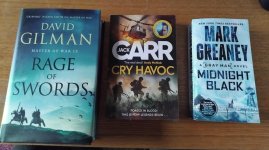


TSCollector
Private
- Joined
- Apr 23, 2024
- Messages
- 34
Sounds like a good time to me.
Desertkiwi
1st Lieutenant
- Joined
- Oct 3, 2009
- Messages
- 4,868
TSCollector
Private
- Joined
- Apr 23, 2024
- Messages
- 34
Desertkiwi
1st Lieutenant
- Joined
- Oct 3, 2009
- Messages
- 4,868
Just finished this one John and it’s a cracking good yarn and hard to put down……enjoy.I've just started my Christmas present book from my daughter, who knows what I like to read .....
View attachment 361365
Now off to have a read before I fall asleep
John
Users who are viewing this thread
Total: 3 (members: 0, guests: 3)


